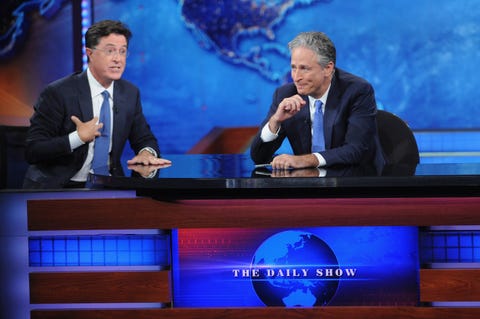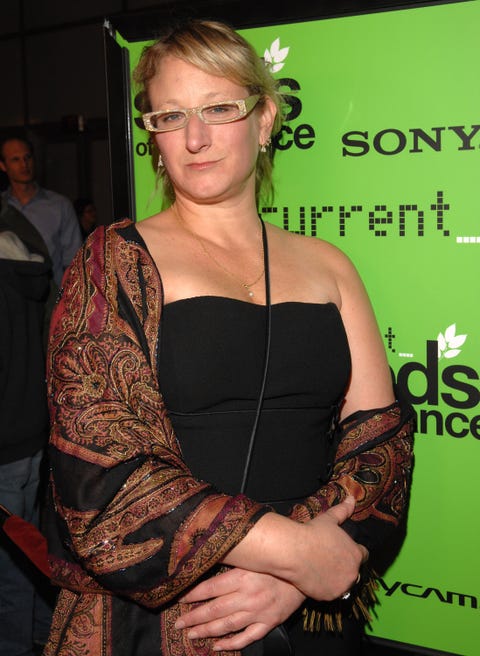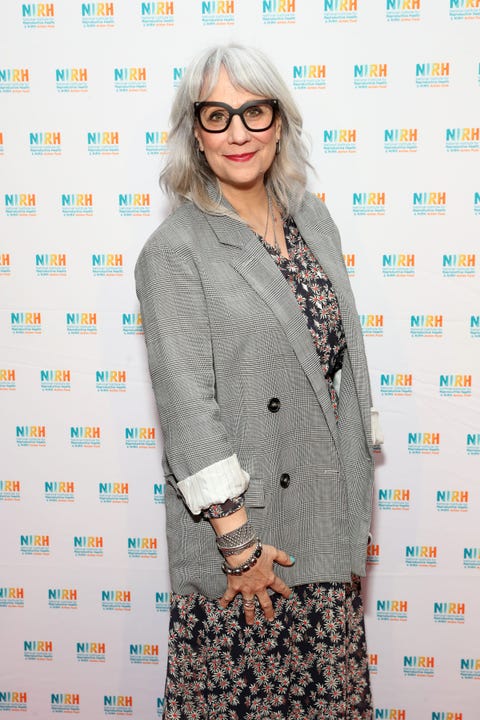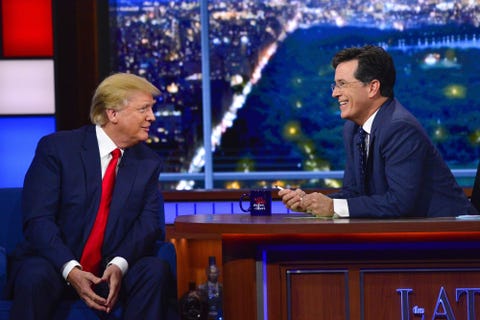If imitation is the highest form of flattery, then The Daily Show must have a monstrous ego. Only a handful of television forms have inspired the same number of byproducts, wannabes, dupes, spin-offs, and successors as the 25-year-old newsroom satire-cum-talk-show. It’s easy to trace many American late-night hits, from Late Night with Seth Meyers to Last Week Tonight with John Oliver to Jimmy Kimmel Live!, back to The Daily Show, which launched with host Craig Kilborn in 1996 but reached its cultural apex with Jon Stewart at the helm. Televised political comedy in the U.S. would likely not exist in its current form without the scrappy cable program as guide and guardian. So it’s all the more arresting that the show, which has propelled the careers of more than a few prominent white men, was, in fact, created by two women.
Madeline Smithberg and Lizz Winstead have already stated for the public record that their influence on The Daily Show feels “erased.” The writer-producer duo, both veterans of The Jon Stewart Show when they migrated to Comedy Central in 1995, lived in the same apartment building in Chelsea at the time. Their friendship was seismic; together, they had undeniably smart ideas. Although they had both left The Daily Show by the end of 2003, they were nevertheless the orchestrators of its genesis. They created the format, they brought in the talent, and—sometimes—they broke the news.
“It’s one of those things where, if you went back in time and tried to do it again, you could never recreate it,” Smithberg says, as she and Winstead prepare for a 25-year anniversary celebration. The two of them are—somehow, impossibly—electric over Zoom. They frequently talk over each other, leaning back and belly-laughing as the other finishes her sentences. They are clearly thrilled to be recognized for their contribution to modern comedy.
Yet, the pair are not without any regrets. They discuss The Daily Show as if it were a slightly insolent firstborn child—adored, even favored, but uncontrollable. The satire has become its own beast; it has taken on a life and a breed that features only pieces of what Smithberg and Winstead created in 1996.
And yet, this is still The Daily Show we’re talking about. It is still one of the first of its kind. And it’s their baby.
Today, the two of them are shepherding their own separate projects: Smithberg is the host of “Mad in the Kitchen,” a YouTube cooking show, and Winstead co-founded Abortion Access Front, a reproductive health organization fueled by comedy. As they now reflect on 25 years since their first episodes of The Daily Show, they shared with ELLE their thoughts on what Trump did for comedy; what today’s talk shows are missing; what they’re most proud to have created; and what, even now, they regret.
I’d imagine it’s bizarre to have lived through a quarter of a century of The Daily Show.
Madeline Smithberg: It’s like—so I get those silly LinkedIn notifications when people are celebrating work anniversaries, and this recent one was for one of the first people we ever hired when we were still in the Comedy Central building. “Congratulate her on 25 years at The Daily Show.” And I dropped my phone! I was like, “That’s not possible because I’m only 27.”
You were a very precocious 2-year-old, then.
MS: Yeah, I was very, very ambitious.
So where did the nugget of an idea that was The Daily Show originate? How did you know it was something with legs?
MS: The Daily Show was really an obsession of Doug Herzog, who was the president of Comedy Central at the time. When Doug got to Comedy Central, he had a bone to pick, and he was obsessed with SportsCenter. His mandate for himself, for Comedy Central as a network, was to create its version of SportsCenter.
Lizz Winstead: That makes me laugh every time I think about it. We were like, “Uh huh, SportsCenter!” And then, “We’ve never seen SportsCenter.”
MS: My son is a giant sports nut, so SportsCenter would get its revenge years later. But anyway, when [Doug] first got to Comedy Central, he came to me and wanted me to be the head of original programming. And I was like, “Do I look like an executive to you?”
And then they offered me The Daily Show. And I said, “Absolutely not.” I was trying to get pregnant. I had been on Letterman for six years, two years of the Jon Stewart Show. I wanted to be on something that was once a week. I just said no. And then Lizz—
LW: I was plotting her death, by the way, if she was going to turn it down. I was literally like, “Madeline, this is secretly your dream,” because it was my dream.
MS: Every time I went to the ladies room, Doug Herzog would corner me and go, “Why won’t you do The Daily Show for me?” And I said, “Doug, we’ve been through this. I’m not going to do it.” And then finally, one day, he pushed so hard. And then came the magic words: “You do not have to shoot a pilot, and I will guarantee you will be on the air for a year.” And I just looked at him and I went, “Okay.” And so it began.
How did you dream up this concept, one that’s been endlessly replicated since?
MS: So we knew it wasn’t a sketch show. We knew it was about what was happening in the world. We knew that it had to feel important with the capital “I,” but more smart and creative. Everybody was angry. I think The Daily Show really was the result of people’s disgust and anger specifically with television news.
LW: The reason that the show really worked is—in creating this foundation—we brought people over from news. We were able to say to somebody, “Hey, why don’t you leave that career that you went to college for to make fun of that thing and destroy your relationships forever?” To be able to have that year-long promise, we were able to get some talent that might not have come if it was just a pilot or a 13-week guarantee. That, and the clarity of vision, are why we get to sit here and talk about it lasting for 25 years.
Do you think part of the show’s longevity is thanks to the fact that it was actual commentary on real events? It was, if we’re being honest, a form of news analysis?
MS: Absolutely. But I don’t think it was our intention for it to be an actual news source, and, when that happened, I was just laughing. The intention was to literally satirize the media and make fun of bad things or questionable things that were happening in the news. But, in order to do that, we had to tell the story first so people could follow along with us. But it was never our intention to be legitimate.
LW: I think, too, we realized, in order to be able to fill a show four nights a week, we had to tell some news stories. And so we had to be, on some level, newsmakers. And when we realized that big stories were coming across the AP wire that weren’t even being reported, I was like, “Oh my God, [the media] is so bad at news!”
So you imitated the news. How did you do that without your own newsroom?
MS: This was before Google and YouTube and stuff. And so, the scrappy, MacGyver way that we did it— we had a friend that worked at Entertainment Tonight or something that gave us their LexisNexis log-in. At one point, we started just recording CNN 24 hours a day, and we built a banner that was bigger than theirs. It was fair use because we were commenting on it. Over the course of the seven years that I was there, we did get footage deals and licensing clips. And we built a library of B-roll.
We loved our jobs. We looked forward to coming to work every day. It was one big, giant family. We went out almost every night after the show; we had parties.
LW: Everybody smoked. We were smoking in the office constantly. I had a bar in my office. I got all of my furniture from a yard sale in the Hamptons.
When you look back at the 25 years of The Daily Show and what you started with, what do you think you nailed? And what do you regret?
MS: I think what we nailed was the fundamental conceit of the entire thing, which is the mock seriousness and earnestness and self-absorption. What I feel the most regretful of is that we did not have more diversity in our writing staff and on our show. Lizz and I are two women. We got, what? One, two female submissions? We got zero of color. We weren’t as aware of the larger problems; we were just fighting to stay alive, and I think that if I could go back, I would have really made a much, much, much deeper effort to get every single kind of diversity represented in our staff, particularly in the writing style. We had a lot of women producers, but it was me and Lizz in the writers’ room.
LW: Yeah, and I think that when you read about the sexism in news and the sexism in comedy, I think that it would have been wise to really tap into our news connections more to say, “Who are some really angry, disgruntled women?” I think we could have found and should have done a better job finding the ragey producers and bringing them over as we did with the men. And I guess the only thing that makes up for it for me now—and I think for you also, Madeline—is that when we moved onto other projects—
MS: We’ve never made that mistake again.
The Daily Show helped set the precedent for late-night political comedy. What, in your opinion, does late-night political comedy need now? What’s missing?
MS: It goes right back to our last conversation. It’s missing women, and it’s missing some more diversity. It’s largely a white man’s club. Samantha Bee is only on once a week, and Amber Ruffin is on Peacock, God bless her. It’s often the white guys’s show. I like them all, by the way. I’ve been watching all of them. I think Seth [Myers] is terrific. I love Jimmy [Kimmel]. I was anti-Fallon ever since the hair ruffling, but he grew on me during the pandemic. The guy is frigging talented, and he has unbelievable writers.
Colbert is Colbert, and it was interesting to watch him try to be pussyfooting and distance himself from politics, then throw everything away with Trump. I don’t know what he’ll do now. But I think it’s great, and then there’s all the shows on Comedy Central that are spin-offs of it that are really interesting. But I think we need to shake it up. It can’t look like a board meeting of the NRA.
LW: I also think viewing habits and patterns and how we live in the world—I’m curious as to how people even watch late-night now. If they watch it in segments, if they watch it on their own time. Like, is late-night TV appointment viewing the way it once was? Or are the segments just what people watch every once in a while?
MS: It still is a refreshing way to process the events of the day. We’ll watch hours and hours and hours of CNN and MSNBC and network. But then, once we’ve processed the raw materials, it’s like, “Okay, how did the late-night show spin it?” It’s just, it feels like an anachronism to not have it feel more reflective of the changing audience.
Here’s a favorite question among comedy critics: In your opinion, was Trump a boon for political comedy?
LW: No, he wasn’t. [He] was a boon for buffoonery. Political comedy done well can be thought-provoking.
So many of the shows that are on late-night right now would not take politics in their packets, shied away from political material—until Trump. And so, Trump was this catalyst. It created, to me, a lot of people doing amateurish political jokes that were about physicality. It was literally dissecting a sociopath. It wasn’t furthering anything.
If you could tell me that people learned the way that they learned about Dick Cheney and Bush’s cabinet and all of that [on The Daily Show], then I would say Trump was good for political comedy. But I would say all Trump did was dominate the conversation so that people couldn’t elevate the other important issues that were happening around it,
MS: The problem with Trump is he’s almost doing the job for the comedians. It’s like gilding the lily; the guy is a self-parody. And I don’t think I agree 100 percent with Lizz. I think it was the easy way for the late-night hosts to do their range of Trump imitations from really good to really okay. But no one was looking at what happened that made this guy get elected and really focusing on what we should be terrified of.
Another common criticism of political comedy is that it stokes the partisan divide rather than repairing it. What’s your response?
LW: I think that, anytime you are blaming comedians for the state of affairs, you are not looking at the big picture. I heard that so much; I heard it about The Daily Show when I was there. “Is it just creating cynicism?” It’s not The Daily Show‘s fault that the media is garbage and people are cynical. People are cynical because they’re not getting information from the media. And the comedians looked at this as an opportunity.
And when people were mad at Jon Stewart for leaving The Daily Show, instead of being mad at a media that’s so terrible they have no place else to go to get information, that ain’t Jon Stewart’s fault. It’s not the comedy writers’s fault. It’s the fault of everyone else that created a marketplace for the messengers bringing it. The partisan divide didn’t happen because of the comedians; the partisan has been there forever.
MS: I wish we could have that much power.
LW: Exactly. If that was true, everybody from The Daily Show could have run for president.
Madeline, you’ve talked before about how you feel political comedy has grown increasingly processed and sanitized over the years. Do you both still feel that way? And do you think the prognosis looks any better now?
MS: As someone who was inside of it, I cannot see it getting better at all. I don’t think there’s anything on network television and comedy that I really would go, “Oh, I got to watch that.” I think that there are some great things, as I said, on the streamers, and that goes back to allowing creative people to do their jobs.
LW: I often think that people put a lot of shiny things around bad writing, and I think that if you lead with quality content, and, like Madeline said, give people the freedom to do what they want to do, they will deliver things that are great.
There’s so much opportunity now. I came in [to The Daily Show] with an activist mind, and I have always worked through an activist lens. I’ve come to terms with the fact that the activist lens leads for me; comedy comes out of my body, but so does activism.
This content is created and maintained by a third party, and imported onto this page to help users provide their email addresses. You may be able to find more information about this and similar content at piano.io




